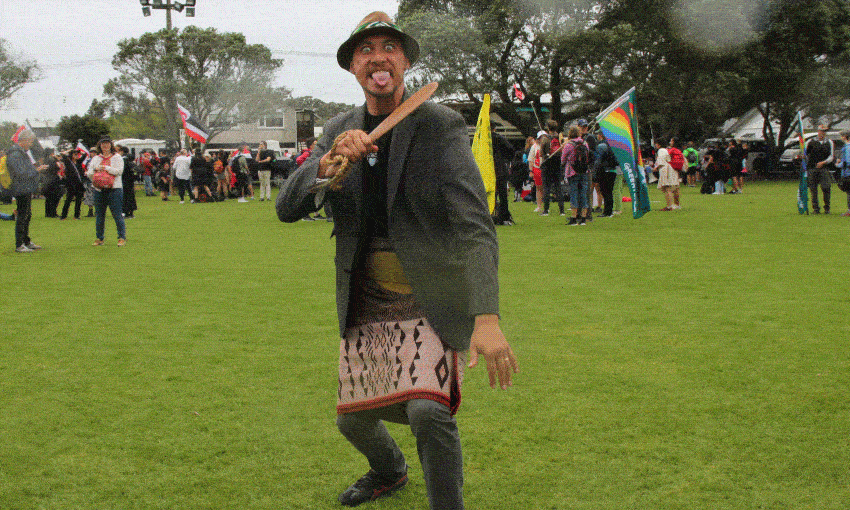- Cyclone Gabrielle was upgraded to a category 2 storm on Thursday morning and is expected to reach category 3 by Friday morning.
- Gabrielle is forecast to hit the upper North Island on Monday, with Northland, Auckland and Coromandel first in the firing line.
- Auckland mayor Wayne Brown says all Aucklanders need to be prepared for another potential severe weather event.
- It’s not yet clear which parts of the North Island will be worst hit.
- The states of emergency in Thames-Coromandel and in Auckland have been extended.
Coromandel could be hammered with up to 300mm of rain in 24 hours as Cyclone Gabrielle hits early next week.
A heavy rain watch is in place for the peninsula, along with Northland and Auckland north of Whangaparāoa, from Sunday morning through to midnight Tuesday.
In the 24 hours from Monday morning to Tuesday morning, between 200-300mm of rain could fall in Coromandel, MetService said.
Auckland and Northland could see between 150-200mm of rain in the same period.
READ MORE:
* Tropical Cyclone Gabrielle set to barrel toward New Zealand
* Potential cyclone on track to hit North Island will form a day sooner
* Weekend brings rain, cold southerly gales, even some snow
A strong wind watch is also in force for Northland and Auckland north of Whangaparāoa from 6am Sunday to midnight Tuesday.
Auckland south of Whangaparāoa and Coromandel Peninsula have a strong wind watch from 6am Monday to midnight Tuesday.
MetService said east to southeast winds “may approach severe gale” in exposed places.
“MetService is expecting significant wind, rain and swell from this cyclone.”
Niwa/Supplied
Cyclone Gabrielle is set to hit Auckland on Monday, but the first effects could be felt in Northland on Sunday.
This would be Coromandel’s fifth storm this summer. It is still in mop-up mode after Cyclone Hale and torrential rain in late January and early February.
Auckland mayor Wayne Brown has extended the region’s state of emergency for another week ahead of Gabrielle making land.
The state of emergency has been in place since January 27, when torrential rain caused devastating flooding, killing four people.
“My decision reflects the seriousness of the current and potential situation and our response,” Brown said on Thursday afternoon.
“After what Aucklanders have experienced since Friday 27 January, and with our region waterlogged, it will be a very serious situation if the current weather forecasts eventuate.”
The concerns over high winds has led Air New Zealand to allow customers travelling from or through Auckland, Whangarei, Kerikeri, Tauranga, Hamilton and New Plymouth between Sunday 12 February and Friday 17 February to be eligible for flexible fares.
“Customers can either hold their fare in credit for 12 months or rebook in the same class of travel between Sunday 12 February 2023 and Wednesday 22 February 2023 without fare difference, penalty or service fees”, Air NZ Chief Customer and Sales Officer Leanne Geraghty said.
The airline will do everything in its power to limit the impact of the cyclone on travel plans, she said, yet customers should be prepared as there may be delays or cancellations.
“With severe winds forecast for the North Island, it’s likely we’ll need to make some changes.”
Meanwhile, officials are preparing additional evacuation shelters for Aucklanders as Cyclone Gabrielle is expected to bring “significant severe weather” to the already upper North Island.
The number of Defence Force personnel helping clean up waste following Auckland’s flood is set to be doubled and the existing state of emergency in the Thames-Coromandel District has been extended.
The storm, currently over the Coral Sea, has reached category 2 and is now moving towards New Zealand. It is expected to reach category 3 by Friday morning.
According to MetService, a category 2 tropical cyclone has an average wind speed of between 89kph and 117kph.
A category 3 tropical cyclone, with the upgraded “severe” designation, has an average wind speed of between 119kph and 157kph.
Niwa/Supplied
Niwa has forecast the potential paths Tropical Cyclone Gabrielle could take over New Zealand.
MetService said very large waves and a storm surge were expected to affect northern and eastern coastlines from Northland to Gisborne from Sunday into Monday.
Wellington and the upper South Island might even be in the firing line, with severe gales predicted and a moderate chance of heavy rain for some easterly areas.
Prime Minister Chris Hipkins has told Kiwis he wants everyone prepared for extreme weather events such as by having emergency supplies ready and a plan for what to do if there was flooding.
“At a government level, we’re making sure that we’re ready to respond quickly when called upon to do so.
MetService/Supplied
Cyclone Gabrielle is currently in the Coral Sea, but is moving south southeast.
“But also, my message to New Zealanders everywhere, is that this is something we’re going to see more of,” Hipkins said.
By Friday afternoon, the Defence Force would have 100 personnel in Auckland (40 Army, 30 Air Force and 30 Navy personnel) to assist with waste removal.
”Auckland authorities are concerned about the risk to people’s health from contaminated waste in and around people’s homes, and there is concern that with the more severe weather forecast that waterways could be potentially contaminated with kerb-side waste.”
A projection published by Niwa on Thursday morning showed Gabrielle could hit almost anywhere in the North Island – including Auckland and Wellington.
There is no word yet on whether schools will close when the cyclone hits.
A Ministry of Education spokesperson said its incident management team “is keeping across the developing weather situation and will coordinate with the emergency management agencies leading the response”.
“All education providers have emergency management plans that are activated, when necessary.”
Far North mayor Moko Tepania said the council was on standby to open its emergency operations centre on Sunday if needed.
The Far North was no stranger to flooding events, he said: The district was still recovering from an August downpour which stranded residents and closed SH1 at Mangamuka.
“We’ve had more than just practice runs in Northland – we’ve learnt from the worst over my entire life.”




















Discussion about this post